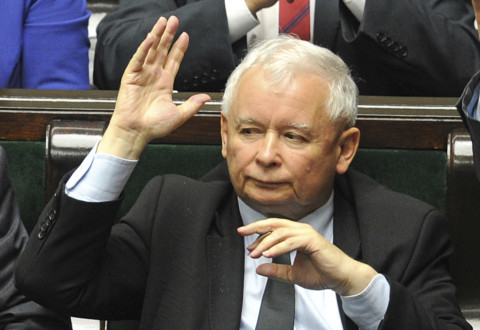
Polish democracy won a partial, momentary reprieve last Monday when President Andrzej Duda vetoed two controversial bills that would have given the ruling Law and Justice party direct power over Poland’s courts. Partial, because President Duda did sign a bill giving the Justice Ministry control over local courts. And momentary, because Duda has said he would introduce his own versions of the legislation soon.
It’s no secret that Law and Justice and its leader, Jaroslaw Kaczynski, have their sights set on judicial independence, one of the few remaining checks on their control of the Polish state. Less well appreciated, but no less clear, is the role that the United States has played in encouraging them to take this latest step.
Kaczynski and his party have been grabbing for power since they won 2015’s parliamentary elections, but this year, they have been particularly brazen. At a European Union (EU) summit meeting in March, they tried to block the election of Donald Tusk, a former Polish prime minister and an opponent of Kaczynski, to a second term as the head of the European Council.
They lost, 27 votes to 1, an embarrassment that contributed to a steep drop in their poll numbers — which, in turn, has encouraged them to aim only higher and bigger. Hence the judiciary bills, which they wrapped in rhetoric about the need for court reform. Into this mess stepped in United States President Donald Trump, himself mired in controversy and looking for good press. And so the White House announced that on his way to the Group of 20 meeting in Hamburg, Germany, earlier this month, he would visit Poland, a country long regarded as the most pro-American in Europe.
The White House set the terms: Trump was to be met by cheering crowds, giving the world the impression of a strong American leader adored by foreign masses and their leaders. Conveniently, because the Three Seas Initiative summit meeting was taking place in Warsaw, Trump could meet with leaders from 11 other countries in the region in one fell swoop. The visit worked for Kaczynski, too — embattled in Europe, his government needed to show that Poland enjoys the respect of one of the world’s most powerful politicians.
And so Trump came to Warsaw, confirmed his commitment to Nato’s Article 5 on collective defence, and promised contracts for the sale of Patriot missiles and natural gas to Poland. Kaczynski’s party bused in cheering crowds, and both sides concluded — with good reason — that the visit was a success. Law and Justice’s standing in the polls improved; the latest, carried out before the vote on judicial reform, showed 38 per cent support for the party and only 19 per cent for Civic Platform, the largest opposition party.
For the price of some applause
Trump’s visit coincided with the judicial legislation, which was already awaiting a vote in the Sejm, the Lower House. But shortly before his arrival, the bills were abruptly withdrawn. Once the poll numbers and press accolades began to pour in, though, the party put the bills back in action, and added a third — to recall the judges of the Supreme Court, so that their successors could be chosen by the Sejm. Because the Supreme Court confirms the results of parliamentary and presidential elections, the bill would have given Law and Justice control not only over the courts, but also over electoral results (this was one of the bills that Duda vetoed).
In short, for the price of some applause, Trump gave Kaczynski the cover to carry out a coup. And what has the US done since? The State Department issued a dry statement formulated not to offend the Polish authorities (“We urge all sides to ensure that any judicial reform does not violate Poland’s Constitution”).
It’s unlikely that Trump meant to condone Kaczynski’s power grab. But by not using his visit to press the Law and Justice leader to respect democracy, Trump gave his implicit imprimatur to a renewed campaign to get the bills into law. And while Duda showed political independence in vetoing two of the bills, he has otherwise been a faithful ally of Kaczynski. We’ll see if his new drafts will really run counter to Kaczynski’s, or only extend Duda’s own influence over the courts at the expense of Law and Justice.
The ultimate responsibility lies with Poles, and it is they who will have to respond — as they have done admirably over the last few weeks, staging big protests that most likely pressured Duda into his vetoes. But until very recently, they wouldn’t have had to go it alone: This is precisely the sort of situation in which previous American presidents could and would have used their country’s prestige to push for freedom and democracy. Instead, beyond the cheers of manufactured masses, all the Polish people hear from the White House is silence.
— New York Times News Serive
Slawomir Sierakowski is a sociologist, a founder of the Krytyka Polityczna movement and the director of the Institute for Advanced Study in Warsaw.












